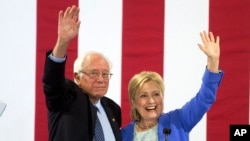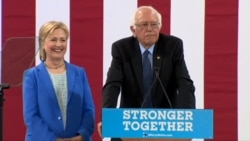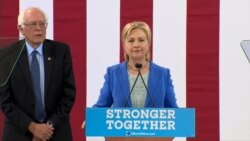Vermont Senator Bernie Sanders, who waged a spirited but unsuccessful campaign against former Secretary of State Hillary Clinton for the U.S. Democratic presidential nomination, endorsed her candidacy Tuesday against Republican Donald Trump.
Sanders called Clinton "far and away the best candidate" and said he intends "to do everything I can to make certain she will be the next president of the United States."
The 74-year-old Sanders, who campaigned against the financial clout of Wall Street chieftains and the growing income inequality in the U.S., cited a lengthy list of his liberal-leaning social policies that Clinton has endorsed after months of campaigning against each other.
Sanders won 22 of the 50 state party primaries and caucuses against Clinton, but she effectively claimed the nomination with a string of victories over him in the country's biggest states with the most delegates to the party's national nominating convention starting July 25.
WATCH: Sanders formally endorses Clinton
"Hillary Clinton knows that something is very wrong when the very rich become richer while many others are working longer hours for lower wages," Sanders said to a cheering crowd.
Even before Sanders joined Clinton at a campaign rally in the northeastern state of New Hampshire, Trump, the billionaire real estate mogul making his first run for elected office, rebuffed Sanders' endorsement of Clinton.
"I am somewhat surprised that Bernie Sanders was not true to himself and his supporters," Trump said in a Twitter message. "They are not happy he is selling out!"
Sanders said, "Hillary Clinton will make an outstanding president and I am proud to stand with her here today."
It has been weeks since it became clear that Clinton would win the Democratic presidential nomination, but Sanders, while saying that they shared the goal of defeating Trump in November's national election, had declined until Tuesday to fully embrace her candidacy as he sought to influence the party's platform of policies.
WATCH: Clinton responds to Sanders' endorsement
Clinton, seeking to become the country's first female president, agreed to support a more than doubling of the country's minimum wage from $7.25 an hour to $15 for low-income workers and move toward providing free college tuition.
The New Hampshire event came a week after Clinton welcomed another major figure to her campaign effort as President Barack Obama appeared with her in the mid-Atlantic state of North Carolina.
Clinton will not become the official Democratic nominee until the party's convention in the eastern city of Philadelphia, Pennsylvania. What remains unclear is the extent Sanders plans to make campaign appearances for her.
He often bested her in the nomination race with support from younger voters, a segment of the American electorate she hopes to capture in the November election to pick a successor to Obama, who leaves office in January.
Trump is expected to claim the Republican nomination next week in the midwestern city of Cleveland, Ohio.
Both Trump and Clinton are poring over lists of potential vice presidential running mates, with Trump expected to name his choice later this week and Clinton days later.







